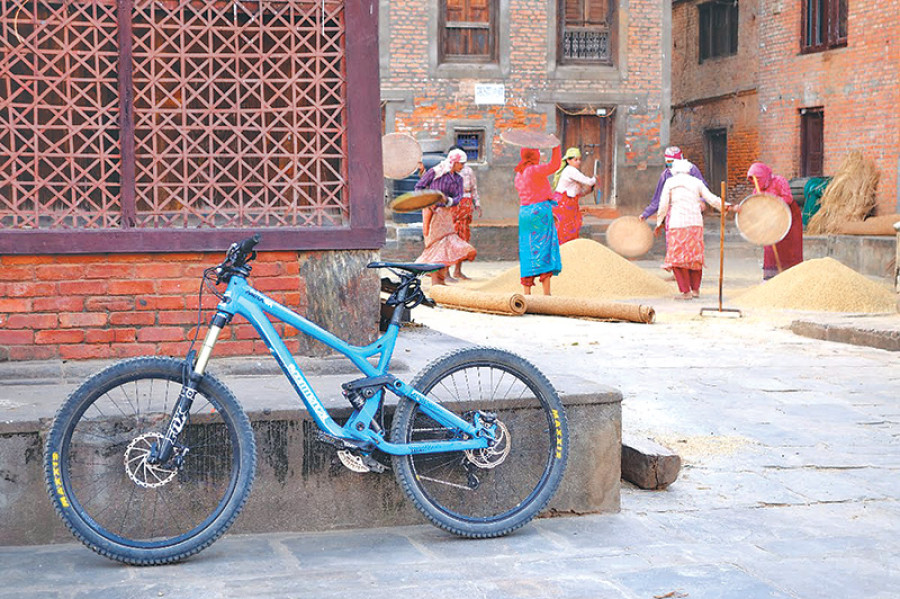Miscellaneous
Confessions of a Kathmandu cyclist
I have been cycling in Kathmandu’s dusty and dangerous streets for the past seven years.
Sanjay Sharma
I have been cycling in Kathmandu’s dusty and dangerous streets for the past seven years. Yes, you do have to share the road with countless not-so-patient cars and motorbikes, and often, plying on these streets that have no bike lanes or lane discipline can seem akin to playing Russian Roulette, but still, at least for me, the pros of cycling this very-cycleable-city still outweigh the cons.
Depending on the day, I either bike from Kalanki to Battisputali, or from Kalanki to Khumaltar, an average of 20 kilometers per day. Yet, despite the health and environmental benefits of cycling, many “look down’ on me for not opting to use a more mechanised and modernised form of transport—this I attribute to how motorcycles and cars are often seen as a necessary economic upgrade. Nonetheless, to be clear, for me, cycling is an active choice, unlike for some who perhaps cycle in the hope of an “upgrade.”
Our society, it seems to me, has been conditioned to value the use and ownership of cars and motorcycles as a necessary step towards greater social recognition. But the social and economic validation motorised vehicle owner receives in society unfortunately does not translate into civility and courtesy on the roads. Many don’t seem to understand, or simply care, about the idea of giving the right of way to pedestrians and cyclists.
While the lack of courtesy on the roads is largely a Nepali problem, the idea of this social upgrade has been instilled by the deep reverence we pay to the west. Nonetheless, the west is slowly getting disenchanted with fossil fuel-based transportation, and bicycles are getting special prominence in urban planning.
In several cities in Europe, bicycles have become the preferred choice for transportation, and that choice has trickled down into countless health benefits. Having reached a saturation-point, these cities have realised that promoting cycles and making public transport more accessible contributes better to the citizens’ well-being.
Europe, and the west in general, went through a history of intense automation, and its subsequent disillusionment, in order to arrive at a place where cycles are being considered as one of the best form of inner-city transportation. I am certain that in the future, Nepali cities will too embrace cycles as they become one of the most convenient ways of staying healthy in our increasingly busy lives.
Many are worried that biking in a city rife with air pollution is a counter-intuitive choice, yet I beg to differ. One of the best ways to cancel the air pollution is to opt for an eco-friendly vehicle. For now, I use a good mask to filter out the smog hoping that my choice to not add to the pollution plays its little part.
I already know of several people who would happily switch to bicycles, if the roads were safer for cyclists. After Dr Prahlad Yonzon died in an accident in 2011, it deterred many from cycling in the city—a reasonably valid concern. However, other means of transportation, such as motorcycles, cars and public vehicles have their own share of risks and frustrations.
The motorcyclists are most prone to fatal accidents, cars can only be afforded by the few, and public vehicles are unreliable and congested to claustrophobic levels.
Which is why, like an evangelical, I keep telling anyone willing to listen: If you felt the blood rush, the throbbing of your heart, the tightening of the ham strings and the relaxation felt after a great day of cycling, you would also switch to cycling in the city.
It cannot be denied that there is a risk in cycling, but the risk does not diminish when switching to say a motorcycle. Besides, the availability of gallis, and small lanes make it easier to commute as one does not have to ride alongside bulky vehicles. And, believe it or not, you will get to your destination just as quickly as you would in other vehicles.
Working your body, I have discovered, puts you in touch with the primordial rhythms of life. Such melody in living cannot be felt in any kind of mental stimulation. So get off that accelerator and become a part of the future. And, if you are not yet inspired, at least please be courteous and try to share the road.
Sharma prefers to burn fat instead of fuel. He tweets at @Khetaarey




 9.22°C Kathmandu
9.22°C Kathmandu










